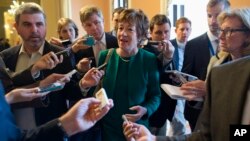The focus on efforts to end the partial U.S. government shutdown and prevent a default shifted to the Senate Saturday as President Barack Obama's bid to reach an agreement with House Republicans appeared to have stalled.
Senate Democratic leader Harry Reid said he and Republican leader Mitch McConnell discussed ways to end the 12-day-old crisis during the unusual Saturday sessions, calling the talks a positive development, but one in which the two sides still have a long way to go.
A Senate motion to debate a Democratic bill to increase the nation's borrowing limit through 2014 and end the shutdown failed. The plan did not include spending cuts or changes in the president's signature health care law, which Republicans want.
Reid criticized Senate Republicans, saying he found the vote hard to believe.
"You know, I had a piece of legislation on the floor today to extend the debt ceiling for a year. It is hard for me to comprehend, but every Republican voted against this," he said.
After the vote, top Senate Democrats went to meet with the president at the White House, where spokesman Jay Carney issued a statement saying it was "unfortunate" that the proposal was "refused a yes or no vote (sic)."
Reid also said a proposal by Republican Senator Susan Collins that would fund U.S. government operations at current levels for another six months would not progress.
"Susan Collins is one of my favorite senators, Democrat or Republican," he said. "I appreciate her efforts, as always, to find a consensus. But the plan that she suggested, that I have seen in writing, is not going to go anyplace at this stage."
Before House members started their Saturday session, Speaker John Boehner told them that there is no deal and no negotiations are taking place with the White House to reopen the government or lift the debt ceiling. Lawmakers say Boehner told them to "hold tough."
In his weekly address Saturday, the president said damage to the country's "sterling credit rating" would make it more expensive for everyone in America to borrow money, creating what would amount to a "Republican default tax on every family and business in America."
He said a default also would have a detrimental effect on global markets.
"It does not have to be this way. It is not supposed to be this way," he said. "Manufacturing crises to extract massive concessions is not how our democracy works, and we have to stop it. Politics is a battle of ideas, but you advance those ideas through elections and legislation, not extortion."
House Armed Services chairman Buck McKeon delivered the Republican address, saying the two sides had found "common ground" this week with legislation supporting the military and their families during the shutdown, and now should continue to work out more agreements to fund some government programs.
"President Obama and Senate Democrats should back these bills immediately," McKeon said. "Then the president should work with us on plans to reopen the entire government and make sure we do not default on our debts.”
The president has repeatedly insisted he will sign only legislation that funds the entire government.
On Friday, finance chiefs of the world's leading economies urged the United States to quickly resolve the stalemate. The G20 finance ministers meeting in Washington said the U.S., with the world's largest economy, "needs to take urgent action to address short-term fiscal uncertainties."
Meanwhile, officials at three of the most famous U.S. national parks — the Statue of Liberty, the Grand Canyon and Mount Rushmore — have announced they will reopen in the coming days.
The move comes after state governors reached deals with the federal government, despite the ongoing government shutdown.
The states have agreed to provide the money needed to operate the parks.
Some information for this report was provided by AP and Reuters.




